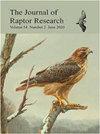阿拉斯加北极地区美国红隼筑巢生物学和长期趋势:2002-2021
IF 1.2
4区 生物学
Q2 ORNITHOLOGY
引用次数: 0
摘要
2002-2021年,我们在阿拉斯加北极地区红隼活动范围北部(北纬66°至68°之间)监测了美洲红隼(Falco sparverius)在箱中筑巢的种群。在研究期间,入住率没有明显的趋势,但每年的入住率变化很大(范围为17-70%)。入住率与5月最低气温(7 ~ 20℃)呈正相关。估计离合启动日期的平均值为5月16日±6天;在研究期间,我们观察到一个轻微但重要的趋势,即较晚的离合器启动(4 d)。红隼的平均窝数为4.7±1.0(范围为1 ~ 7),平均窝数为4.6±0.8,平均最小羽化/成功对数为4.9±0.4。2002-2021年,窝卵和窝卵数量保持稳定,无明显趋势。巢巢失败率低(16%)。我们报告了2018年的延迟筑巢和可能的双孵尝试,这表明可能对正常筑巢季节结束时平均温度的变暖趋势(2002-2021)做出反应。本文章由计算机程序翻译,如有差异,请以英文原文为准。
AMERICAN KESTREL NESTING BIOLOGY AND LONG-TERM TRENDS IN THE ALASKAN ARCTIC: 2002–2021
We monitored a population of American Kestrels (Falco sparverius) nesting in boxes at the northern extent of the kestrel range (between 66° and 68°N) in the Alaskan Arctic, 2002–2021. There was no significant trend in occupancy during the study period but yearly variation in occupancy was high (range = 17–70%). Occupancy rate was positively related to the lowest temperature recorded in May (7–20°C). The mean estimated clutch initiation date was 16 May ± 6 d; we observed a slight but significant trend for later clutch initiation (4 d) during the study period. Kestrel clutch size averaged 4.7 ± 1.0 (range = 1–7), brood size averaged 4.6 ± 0.8, and the mean minimum number of young fledged/successful pair was 4.9 ± 0.4. Clutch and brood sizes remained stable from 2002–2021, with no significant trend. Nest failure was low (16%). We report a late nesting and possible double brooding attempt in 2018, suggesting a possible response to the warming trend (2002–2021) in average temperatures at the end of the normal nesting season.
求助全文
通过发布文献求助,成功后即可免费获取论文全文。
去求助
来源期刊

Journal of Raptor Research
生物-鸟类学
CiteScore
2.30
自引率
17.60%
发文量
61
审稿时长
>12 weeks
期刊介绍:
The Journal of Raptor Research (JRR) is an international scientific journal dedicated entirely to the dissemination of information about birds of prey. Established in 1967, JRR has published peer-reviewed research on raptor ecology, behavior, life history, conservation, and techniques. JRR is available quarterly to members in electronic and paper format.
 求助内容:
求助内容: 应助结果提醒方式:
应助结果提醒方式:


